Global Business Management Analysis: Greek Firms Performance
VerifiedAdded on 2022/08/20
|7
|1457
|19
Report
AI Summary
This report provides a comprehensive analysis of the factors influencing the performance of Greek industrial firms from 1997 to 2004, within the context of globalization. The study examines the impact of key determinants, distinguishing between financial and non-financial drivers, and utilizes return on sales, return on assets, and return on equity as key performance indicators. The analysis reveals that leverage, export activity, location, size, and effective management significantly impact firm performance in Greece. Furthermore, the report suggests that profitable firms are large, young, exporting firms with strong management teams, optimal debt-equity ratios, and efficient use of liquidity for investments. The report also suggests that cultural challenges faced by firms is a key factor for analysis.
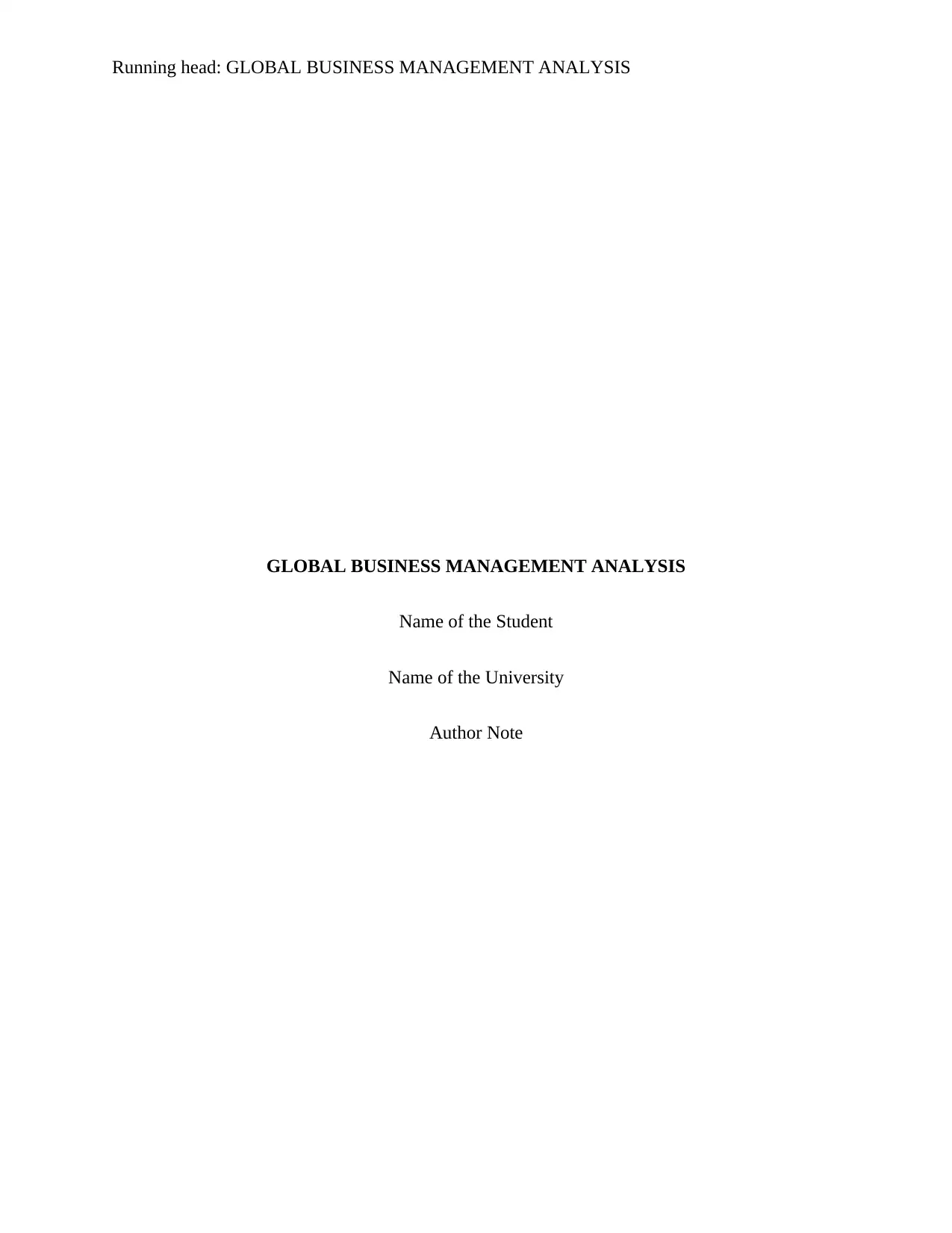
Running head: GLOBAL BUSINESS MANAGEMENT ANALYSIS
GLOBAL BUSINESS MANAGEMENT ANALYSIS
Name of the Student
Name of the University
Author Note
GLOBAL BUSINESS MANAGEMENT ANALYSIS
Name of the Student
Name of the University
Author Note
Paraphrase This Document
Need a fresh take? Get an instant paraphrase of this document with our AI Paraphraser
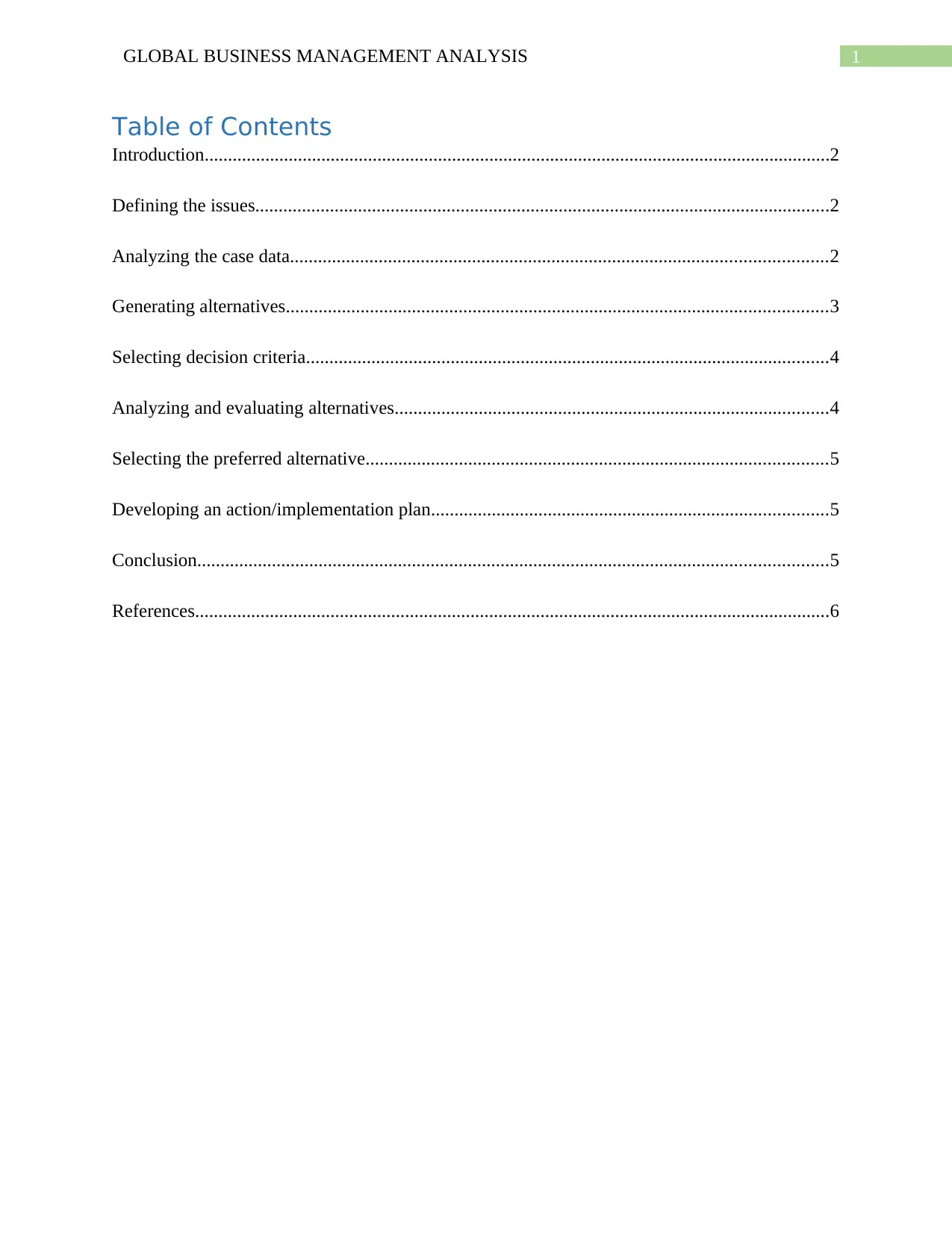
1GLOBAL BUSINESS MANAGEMENT ANALYSIS
Table of Contents
Introduction......................................................................................................................................2
Defining the issues...........................................................................................................................2
Analyzing the case data...................................................................................................................2
Generating alternatives....................................................................................................................3
Selecting decision criteria................................................................................................................4
Analyzing and evaluating alternatives.............................................................................................4
Selecting the preferred alternative...................................................................................................5
Developing an action/implementation plan.....................................................................................5
Conclusion.......................................................................................................................................5
References........................................................................................................................................6
Table of Contents
Introduction......................................................................................................................................2
Defining the issues...........................................................................................................................2
Analyzing the case data...................................................................................................................2
Generating alternatives....................................................................................................................3
Selecting decision criteria................................................................................................................4
Analyzing and evaluating alternatives.............................................................................................4
Selecting the preferred alternative...................................................................................................5
Developing an action/implementation plan.....................................................................................5
Conclusion.......................................................................................................................................5
References........................................................................................................................................6
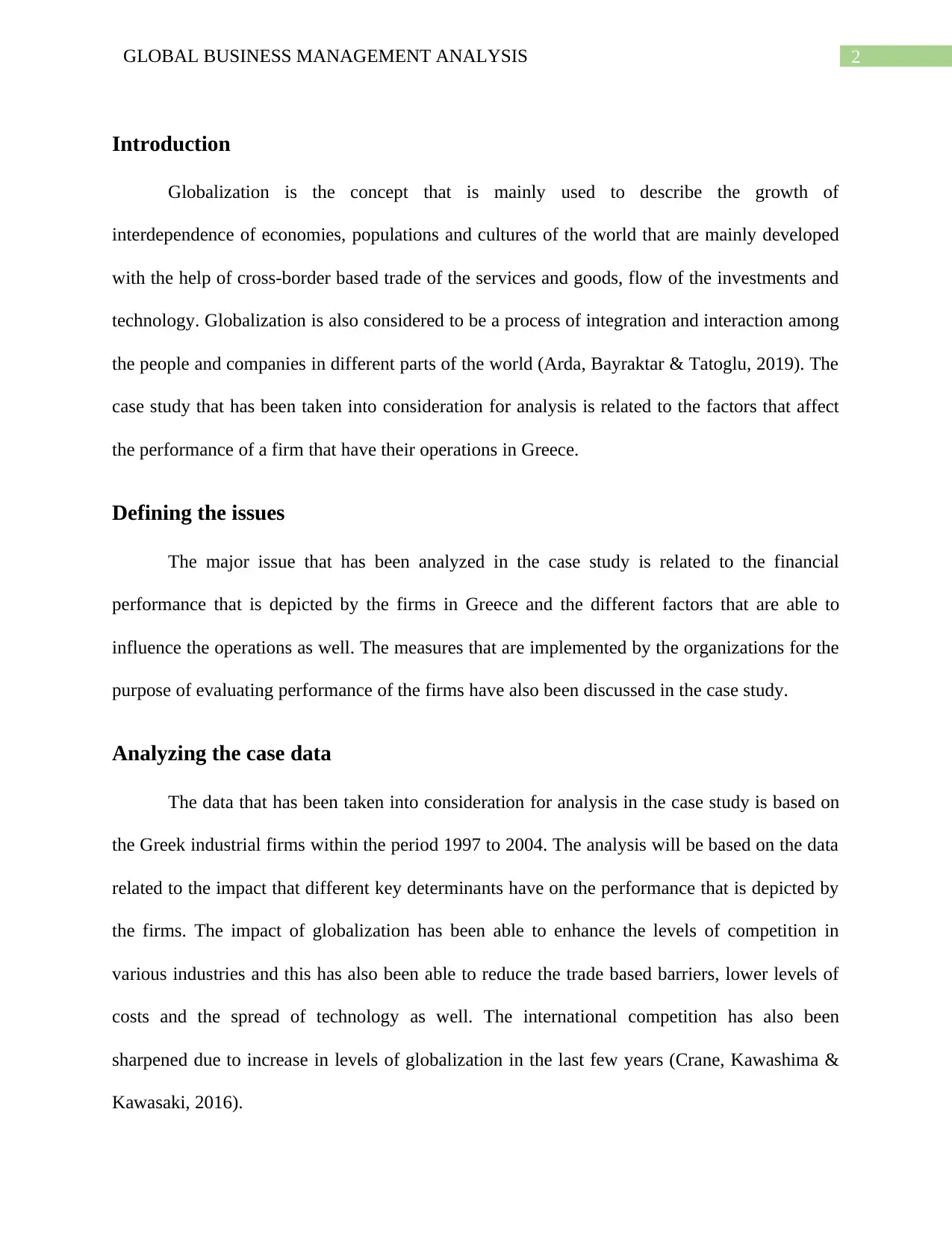
2GLOBAL BUSINESS MANAGEMENT ANALYSIS
Introduction
Globalization is the concept that is mainly used to describe the growth of
interdependence of economies, populations and cultures of the world that are mainly developed
with the help of cross-border based trade of the services and goods, flow of the investments and
technology. Globalization is also considered to be a process of integration and interaction among
the people and companies in different parts of the world (Arda, Bayraktar & Tatoglu, 2019). The
case study that has been taken into consideration for analysis is related to the factors that affect
the performance of a firm that have their operations in Greece.
Defining the issues
The major issue that has been analyzed in the case study is related to the financial
performance that is depicted by the firms in Greece and the different factors that are able to
influence the operations as well. The measures that are implemented by the organizations for the
purpose of evaluating performance of the firms have also been discussed in the case study.
Analyzing the case data
The data that has been taken into consideration for analysis in the case study is based on
the Greek industrial firms within the period 1997 to 2004. The analysis will be based on the data
related to the impact that different key determinants have on the performance that is depicted by
the firms. The impact of globalization has been able to enhance the levels of competition in
various industries and this has also been able to reduce the trade based barriers, lower levels of
costs and the spread of technology as well. The international competition has also been
sharpened due to increase in levels of globalization in the last few years (Crane, Kawashima &
Kawasaki, 2016).
Introduction
Globalization is the concept that is mainly used to describe the growth of
interdependence of economies, populations and cultures of the world that are mainly developed
with the help of cross-border based trade of the services and goods, flow of the investments and
technology. Globalization is also considered to be a process of integration and interaction among
the people and companies in different parts of the world (Arda, Bayraktar & Tatoglu, 2019). The
case study that has been taken into consideration for analysis is related to the factors that affect
the performance of a firm that have their operations in Greece.
Defining the issues
The major issue that has been analyzed in the case study is related to the financial
performance that is depicted by the firms in Greece and the different factors that are able to
influence the operations as well. The measures that are implemented by the organizations for the
purpose of evaluating performance of the firms have also been discussed in the case study.
Analyzing the case data
The data that has been taken into consideration for analysis in the case study is based on
the Greek industrial firms within the period 1997 to 2004. The analysis will be based on the data
related to the impact that different key determinants have on the performance that is depicted by
the firms. The impact of globalization has been able to enhance the levels of competition in
various industries and this has also been able to reduce the trade based barriers, lower levels of
costs and the spread of technology as well. The international competition has also been
sharpened due to increase in levels of globalization in the last few years (Crane, Kawashima &
Kawasaki, 2016).
⊘ This is a preview!⊘
Do you want full access?
Subscribe today to unlock all pages.

Trusted by 1+ million students worldwide
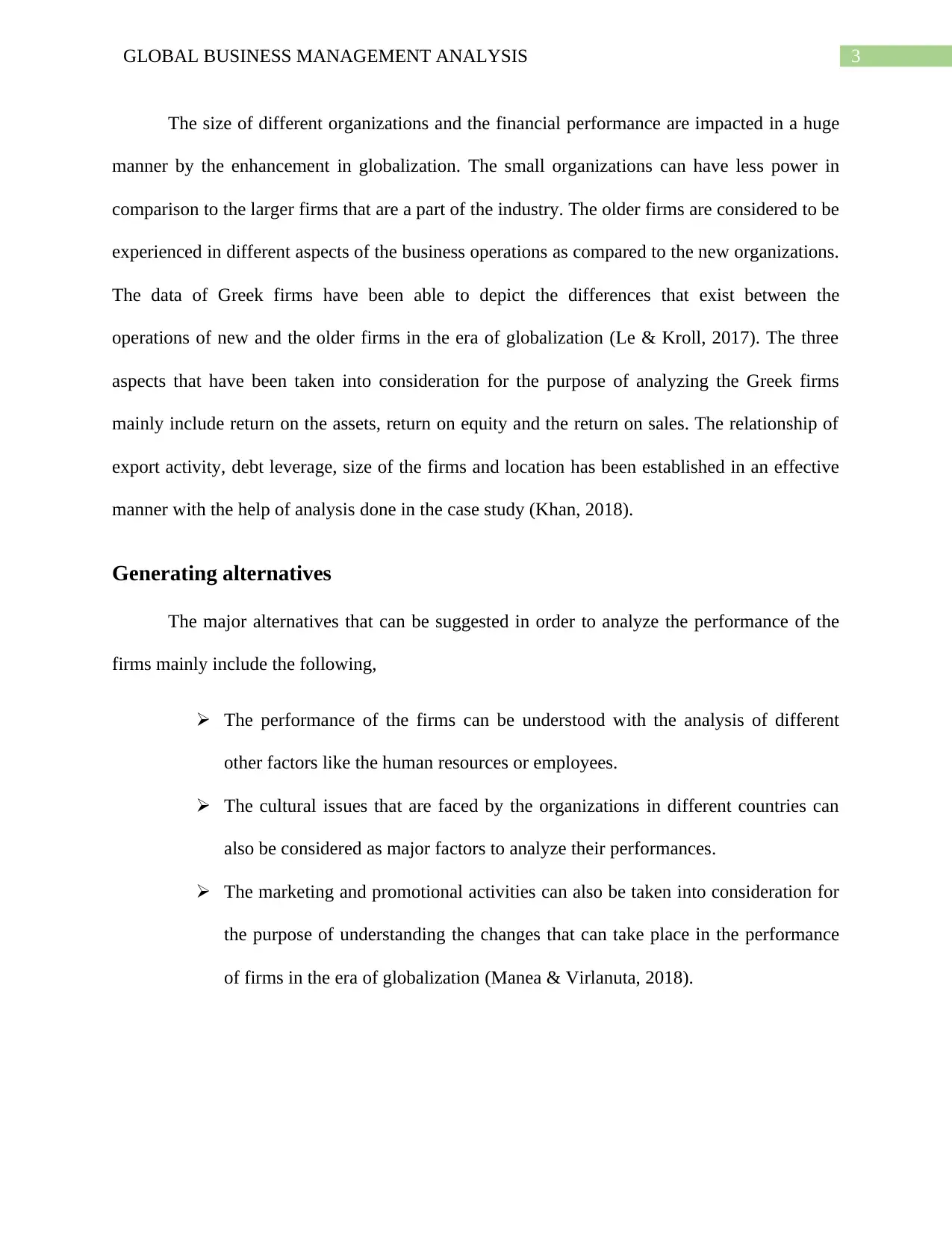
3GLOBAL BUSINESS MANAGEMENT ANALYSIS
The size of different organizations and the financial performance are impacted in a huge
manner by the enhancement in globalization. The small organizations can have less power in
comparison to the larger firms that are a part of the industry. The older firms are considered to be
experienced in different aspects of the business operations as compared to the new organizations.
The data of Greek firms have been able to depict the differences that exist between the
operations of new and the older firms in the era of globalization (Le & Kroll, 2017). The three
aspects that have been taken into consideration for the purpose of analyzing the Greek firms
mainly include return on the assets, return on equity and the return on sales. The relationship of
export activity, debt leverage, size of the firms and location has been established in an effective
manner with the help of analysis done in the case study (Khan, 2018).
Generating alternatives
The major alternatives that can be suggested in order to analyze the performance of the
firms mainly include the following,
The performance of the firms can be understood with the analysis of different
other factors like the human resources or employees.
The cultural issues that are faced by the organizations in different countries can
also be considered as major factors to analyze their performances.
The marketing and promotional activities can also be taken into consideration for
the purpose of understanding the changes that can take place in the performance
of firms in the era of globalization (Manea & Virlanuta, 2018).
The size of different organizations and the financial performance are impacted in a huge
manner by the enhancement in globalization. The small organizations can have less power in
comparison to the larger firms that are a part of the industry. The older firms are considered to be
experienced in different aspects of the business operations as compared to the new organizations.
The data of Greek firms have been able to depict the differences that exist between the
operations of new and the older firms in the era of globalization (Le & Kroll, 2017). The three
aspects that have been taken into consideration for the purpose of analyzing the Greek firms
mainly include return on the assets, return on equity and the return on sales. The relationship of
export activity, debt leverage, size of the firms and location has been established in an effective
manner with the help of analysis done in the case study (Khan, 2018).
Generating alternatives
The major alternatives that can be suggested in order to analyze the performance of the
firms mainly include the following,
The performance of the firms can be understood with the analysis of different
other factors like the human resources or employees.
The cultural issues that are faced by the organizations in different countries can
also be considered as major factors to analyze their performances.
The marketing and promotional activities can also be taken into consideration for
the purpose of understanding the changes that can take place in the performance
of firms in the era of globalization (Manea & Virlanuta, 2018).
Paraphrase This Document
Need a fresh take? Get an instant paraphrase of this document with our AI Paraphraser
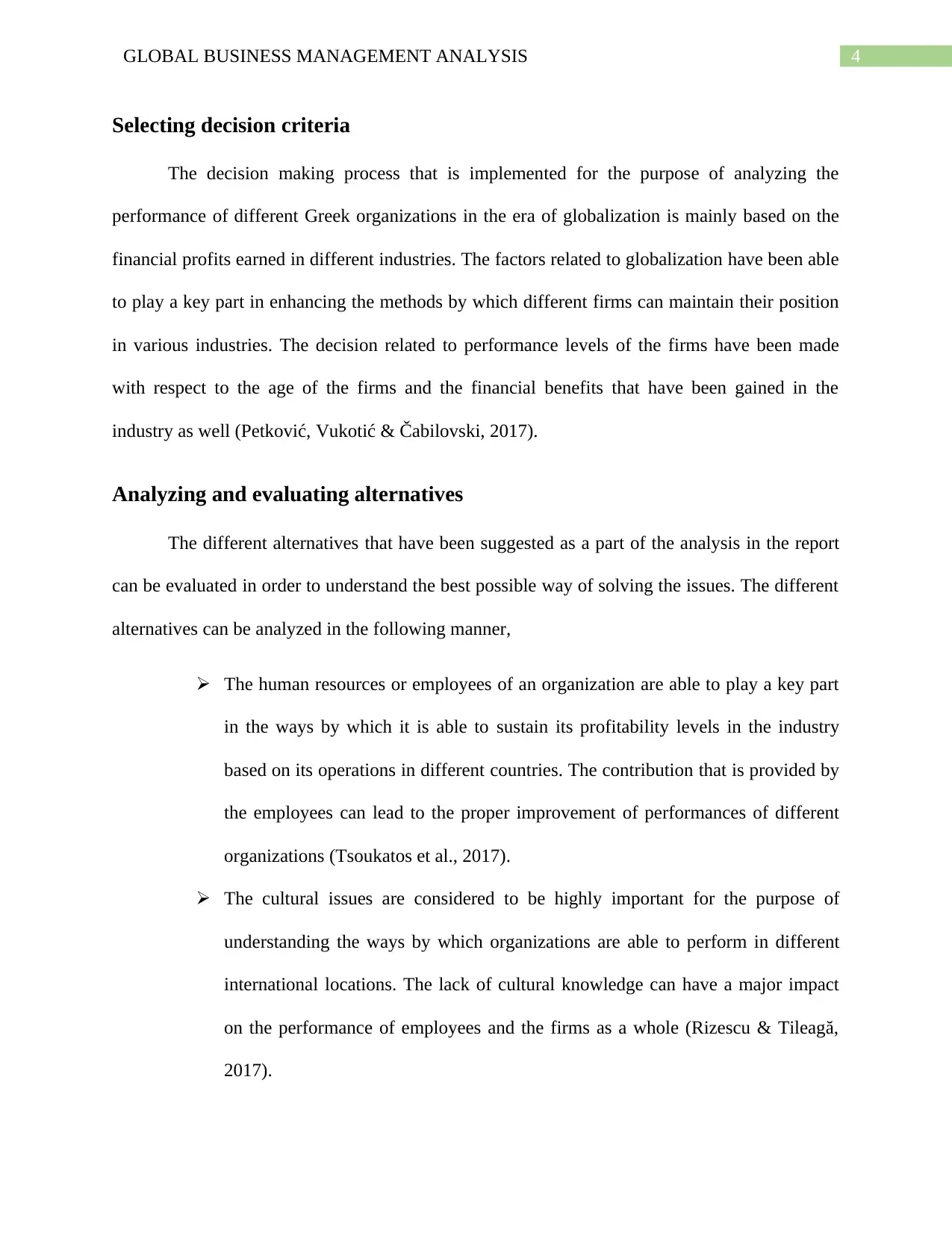
4GLOBAL BUSINESS MANAGEMENT ANALYSIS
Selecting decision criteria
The decision making process that is implemented for the purpose of analyzing the
performance of different Greek organizations in the era of globalization is mainly based on the
financial profits earned in different industries. The factors related to globalization have been able
to play a key part in enhancing the methods by which different firms can maintain their position
in various industries. The decision related to performance levels of the firms have been made
with respect to the age of the firms and the financial benefits that have been gained in the
industry as well (Petković, Vukotić & Čabilovski, 2017).
Analyzing and evaluating alternatives
The different alternatives that have been suggested as a part of the analysis in the report
can be evaluated in order to understand the best possible way of solving the issues. The different
alternatives can be analyzed in the following manner,
The human resources or employees of an organization are able to play a key part
in the ways by which it is able to sustain its profitability levels in the industry
based on its operations in different countries. The contribution that is provided by
the employees can lead to the proper improvement of performances of different
organizations (Tsoukatos et al., 2017).
The cultural issues are considered to be highly important for the purpose of
understanding the ways by which organizations are able to perform in different
international locations. The lack of cultural knowledge can have a major impact
on the performance of employees and the firms as a whole (Rizescu & Tileagă,
2017).
Selecting decision criteria
The decision making process that is implemented for the purpose of analyzing the
performance of different Greek organizations in the era of globalization is mainly based on the
financial profits earned in different industries. The factors related to globalization have been able
to play a key part in enhancing the methods by which different firms can maintain their position
in various industries. The decision related to performance levels of the firms have been made
with respect to the age of the firms and the financial benefits that have been gained in the
industry as well (Petković, Vukotić & Čabilovski, 2017).
Analyzing and evaluating alternatives
The different alternatives that have been suggested as a part of the analysis in the report
can be evaluated in order to understand the best possible way of solving the issues. The different
alternatives can be analyzed in the following manner,
The human resources or employees of an organization are able to play a key part
in the ways by which it is able to sustain its profitability levels in the industry
based on its operations in different countries. The contribution that is provided by
the employees can lead to the proper improvement of performances of different
organizations (Tsoukatos et al., 2017).
The cultural issues are considered to be highly important for the purpose of
understanding the ways by which organizations are able to perform in different
international locations. The lack of cultural knowledge can have a major impact
on the performance of employees and the firms as a whole (Rizescu & Tileagă,
2017).
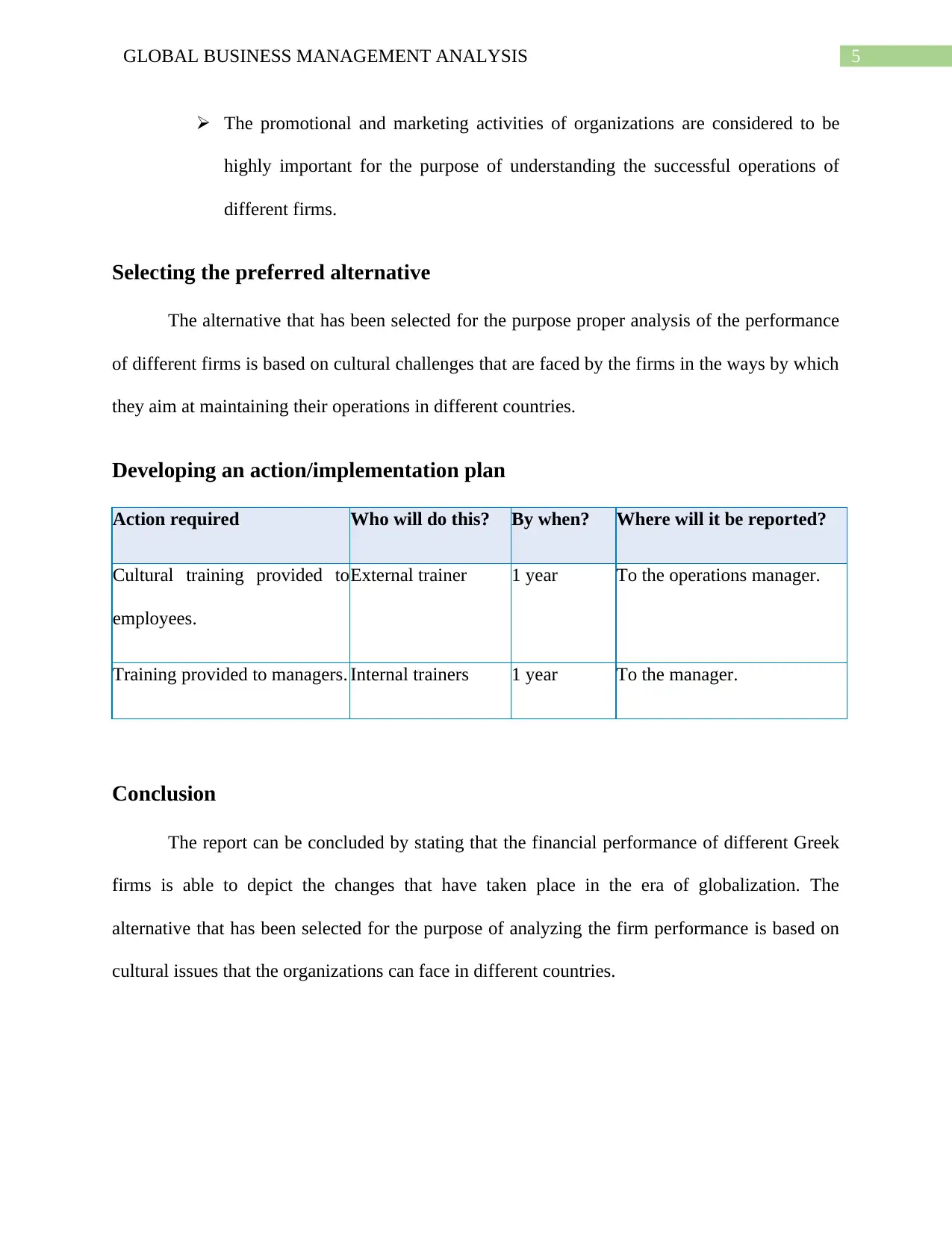
5GLOBAL BUSINESS MANAGEMENT ANALYSIS
The promotional and marketing activities of organizations are considered to be
highly important for the purpose of understanding the successful operations of
different firms.
Selecting the preferred alternative
The alternative that has been selected for the purpose proper analysis of the performance
of different firms is based on cultural challenges that are faced by the firms in the ways by which
they aim at maintaining their operations in different countries.
Developing an action/implementation plan
Action required Who will do this? By when? Where will it be reported?
Cultural training provided to
employees.
External trainer 1 year To the operations manager.
Training provided to managers. Internal trainers 1 year To the manager.
Conclusion
The report can be concluded by stating that the financial performance of different Greek
firms is able to depict the changes that have taken place in the era of globalization. The
alternative that has been selected for the purpose of analyzing the firm performance is based on
cultural issues that the organizations can face in different countries.
The promotional and marketing activities of organizations are considered to be
highly important for the purpose of understanding the successful operations of
different firms.
Selecting the preferred alternative
The alternative that has been selected for the purpose proper analysis of the performance
of different firms is based on cultural challenges that are faced by the firms in the ways by which
they aim at maintaining their operations in different countries.
Developing an action/implementation plan
Action required Who will do this? By when? Where will it be reported?
Cultural training provided to
employees.
External trainer 1 year To the operations manager.
Training provided to managers. Internal trainers 1 year To the manager.
Conclusion
The report can be concluded by stating that the financial performance of different Greek
firms is able to depict the changes that have taken place in the era of globalization. The
alternative that has been selected for the purpose of analyzing the firm performance is based on
cultural issues that the organizations can face in different countries.
⊘ This is a preview!⊘
Do you want full access?
Subscribe today to unlock all pages.

Trusted by 1+ million students worldwide
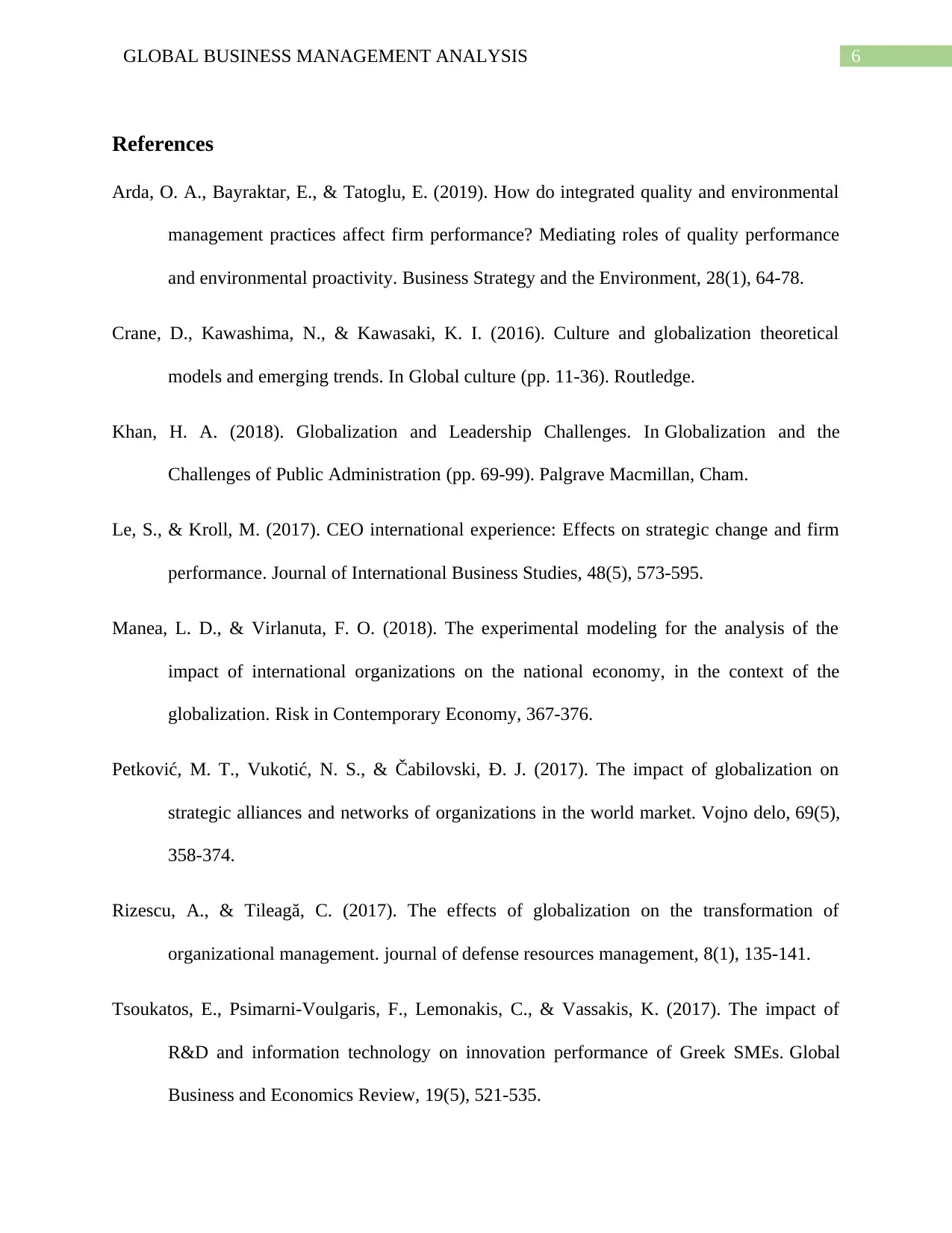
6GLOBAL BUSINESS MANAGEMENT ANALYSIS
References
Arda, O. A., Bayraktar, E., & Tatoglu, E. (2019). How do integrated quality and environmental
management practices affect firm performance? Mediating roles of quality performance
and environmental proactivity. Business Strategy and the Environment, 28(1), 64-78.
Crane, D., Kawashima, N., & Kawasaki, K. I. (2016). Culture and globalization theoretical
models and emerging trends. In Global culture (pp. 11-36). Routledge.
Khan, H. A. (2018). Globalization and Leadership Challenges. In Globalization and the
Challenges of Public Administration (pp. 69-99). Palgrave Macmillan, Cham.
Le, S., & Kroll, M. (2017). CEO international experience: Effects on strategic change and firm
performance. Journal of International Business Studies, 48(5), 573-595.
Manea, L. D., & Virlanuta, F. O. (2018). The experimental modeling for the analysis of the
impact of international organizations on the national economy, in the context of the
globalization. Risk in Contemporary Economy, 367-376.
Petković, M. T., Vukotić, N. S., & Čabilovski, Đ. J. (2017). The impact of globalization on
strategic alliances and networks of organizations in the world market. Vojno delo, 69(5),
358-374.
Rizescu, A., & Tileagă, C. (2017). The effects of globalization on the transformation of
organizational management. journal of defense resources management, 8(1), 135-141.
Tsoukatos, E., Psimarni-Voulgaris, F., Lemonakis, C., & Vassakis, K. (2017). The impact of
R&D and information technology on innovation performance of Greek SMEs. Global
Business and Economics Review, 19(5), 521-535.
References
Arda, O. A., Bayraktar, E., & Tatoglu, E. (2019). How do integrated quality and environmental
management practices affect firm performance? Mediating roles of quality performance
and environmental proactivity. Business Strategy and the Environment, 28(1), 64-78.
Crane, D., Kawashima, N., & Kawasaki, K. I. (2016). Culture and globalization theoretical
models and emerging trends. In Global culture (pp. 11-36). Routledge.
Khan, H. A. (2018). Globalization and Leadership Challenges. In Globalization and the
Challenges of Public Administration (pp. 69-99). Palgrave Macmillan, Cham.
Le, S., & Kroll, M. (2017). CEO international experience: Effects on strategic change and firm
performance. Journal of International Business Studies, 48(5), 573-595.
Manea, L. D., & Virlanuta, F. O. (2018). The experimental modeling for the analysis of the
impact of international organizations on the national economy, in the context of the
globalization. Risk in Contemporary Economy, 367-376.
Petković, M. T., Vukotić, N. S., & Čabilovski, Đ. J. (2017). The impact of globalization on
strategic alliances and networks of organizations in the world market. Vojno delo, 69(5),
358-374.
Rizescu, A., & Tileagă, C. (2017). The effects of globalization on the transformation of
organizational management. journal of defense resources management, 8(1), 135-141.
Tsoukatos, E., Psimarni-Voulgaris, F., Lemonakis, C., & Vassakis, K. (2017). The impact of
R&D and information technology on innovation performance of Greek SMEs. Global
Business and Economics Review, 19(5), 521-535.
1 out of 7
Related Documents
Your All-in-One AI-Powered Toolkit for Academic Success.
+13062052269
info@desklib.com
Available 24*7 on WhatsApp / Email
![[object Object]](/_next/static/media/star-bottom.7253800d.svg)
Unlock your academic potential
Copyright © 2020–2025 A2Z Services. All Rights Reserved. Developed and managed by ZUCOL.





